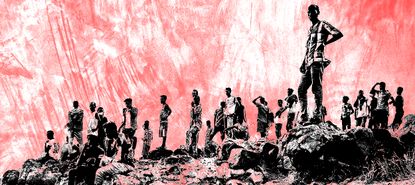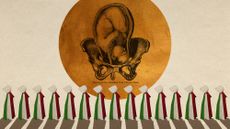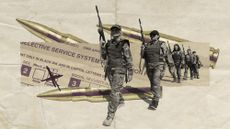The invisible crisis in Ethiopia
More than a million people have been displaced almost overnight. Does anyone in the U.S. realize it?


While Americans awaited the result of the 2020 presidential election with glib accusations about the collapse of civilization, half a world away the people of the Tigray region of northern Ethiopia experienced it.
On November 4, security forces taking the side of the dominant ethno-nationalist political party in Tigray attacked a military command center in Mekelle, the capital of the region. This seems to have been in response to Prime Minister Abiy Ahmed's attempts to merge Ethiopia's long-standing but uneasy coalition of regional and ethnic political factions into a single party representing the entire nation. The result has been a civil war, one that has been all but invisible in the United States.
The sad truth is that there has been very little reliable reporting about Tigray in the last month. What we do know is horrifying enough. Electricity, internet, and other utilities have been shut down throughout the region, with both sides insisting that the other was responsible. At least a million people have become refugees virtually overnight, including nearly a 100,000 Eritreans who had already fled to Tigray. The United Nations and our own secretary of state are demanding that humanitarian observers be allowed entry to the region, and the European Union is preparing to offer hundreds of millions of dollars in aid to Sudan, which, despite having officially closed its borders, is currently bearing most of the refugee burden from the conflict. (As far as I am aware there have been no serious calls for any western country to house even a fraction of those currently displaced.) This is what the actual breakdown of "democracy" looks like.
Subscribe to The Week
Escape your echo chamber. Get the facts behind the news, plus analysis from multiple perspectives.

Sign up for The Week's Free Newsletters
From our morning news briefing to a weekly Good News Newsletter, get the best of The Week delivered directly to your inbox.
From our morning news briefing to a weekly Good News Newsletter, get the best of The Week delivered directly to your inbox.
Writers, including this columnist, often accuse the American people of being indifferent to the world's problems. But increasingly it seems to me that a better way of putting it is that the world is indifferent to ours. A story that has hovered near the top of the news aggregator I read every morning for the last two weeks — during what we are supposed to believe are the death throes of a fascist junta amid the spread of a new Black Death — is about whether an actress who has made dismissive comments about cloth face coverings should not be allowed to play a space mercenary in a popular streaming program. (This should not be confused with yet another story about an actress from the same show alleging that the woman who plays a snake-headed warrior princess is guilty of something called "deadnaming," also apparently grounds for her dismissal.)
It would be interesting to ask Tigrayan refugees what they think about insufficient LGBT representation in comic book films or various other outrages that (we are told) rank very high among the crimes, follies, and misfortunes of mankind. Are they worried about an increase in what we call "cases," positive test results for a disease that has spread across the African continent relatively inconsequentially during the last year? What about the latest stock market rally?
There are a number of conclusions to be drawn from the situation in Ethiopia. One is that we should be grateful for our prosperity. Even the poorest Americans are wealthy beyond the reckoning of the global poor, whose exploitation makes the former possible. We should also acknowledge that nationalism, the proximate cause of the conflict in Tigray, is a curse, and that it is on balance a very good thing that vanishingly few of us are willing to take up arms on behalf of an abstract belief in the right to racial or tribal "self-determination." The fact that ethnicity itself has nothing to do with one's identity as an American is a great blessing.
But our reflections cannot end there. We live in a country in which performative outrage about the outgoing president's use of social media makes our best educated citizens despair about the future of our political and economic order, and one in which it is possible for a faraway region home to some 5 million people — roughly equivalent to the population of Washington, D.C. — to become immiserated overnight without attracting our attention, much less our sympathy.
Something is wrong here.
Create an account with the same email registered to your subscription to unlock access.
Sign up for Today's Best Articles in your inbox
A free daily email with the biggest news stories of the day – and the best features from TheWeek.com
Matthew Walther is a national correspondent at The Week. His work has also appeared in First Things, The Spectator of London, The Catholic Herald, National Review, and other publications. He is currently writing a biography of the Rev. Montague Summers. He is also a Robert Novak Journalism Fellow.
-
 Italian senate passes law allowing anti-abortion activists into clinics
Italian senate passes law allowing anti-abortion activists into clinicsUnder The Radar Giorgia Meloni scores a political 'victory' but will it make much difference in practice?
By Chas Newkey-Burden, The Week UK Published
-
 Magazine interactive crossword - May 3, 2024
Magazine interactive crossword - May 3, 2024Puzzles and Quizzes Issue - May 3, 2024
By The Week US Published
-
 Magazine solutions - May 3, 2024
Magazine solutions - May 3, 2024Puzzles and Quizzes Issue - May 3, 2024
By The Week US Published
-
 How would we know if World War Three had started?
How would we know if World War Three had started?Today's Big Question With conflicts in Ukraine, Middle East, Africa and Asia-Pacific, the 'spark' that could ignite all-out war 'already exists'
By Harriet Marsden, The Week UK Published
-
 The issue of women and conscription
The issue of women and conscriptionUnder the radar Ukraine military adviser hints at widening draft to women, as other countries weigh defence options amid global insecurity
By Harriet Marsden, The Week UK Published
-
 Ukraine's unconventional approach to reconstruction
Ukraine's unconventional approach to reconstructionUnder the radar Digitally savvy nation uses popular app to file compensation claims, access funds and rebuild destroyed homes
By Harriet Marsden, The Week UK Published
-
 Will Ukraine's leadership reset work?
Will Ukraine's leadership reset work?Today's Big Question Zelenskyy hints at ousting of popular military chief, but risks backlash amid dwindling munitions, delayed funding and Russian bombardment
By Harriet Marsden, The Week UK Published
-
 Imran Khan sentenced to 10 years: how powerful is Pakistan's military?
Imran Khan sentenced to 10 years: how powerful is Pakistan's military?Today's Big Question The country's armed forces ignore country's economic woes, control its institutions and, critics say, engineer election results
By Harriet Marsden, The Week UK Published
-
 What is Iran's endgame?
What is Iran's endgame?Today's Big Question Tehran seeks to supplant US and Saudi Arabia as dominant power in Middle East while forcing Israel to end Gaza war
By Harriet Marsden, The Week UK Published
-
 Israel proposes two-month pause in Gaza war in exchange for all Hamas hostages
Israel proposes two-month pause in Gaza war in exchange for all Hamas hostagesSpeed Read Deal doesn't include an agreement to end war, but might be 'the only path that could lead to a ceasefire', said US officials
By Harriet Marsden, The Week UK Published
-
 Nato official warns of all-out war with Russia in next 20 years
Nato official warns of all-out war with Russia in next 20 yearsSpeed Read Civilians must prepare for life-changing conflict and mass mobilisation, says military chief
By Harriet Marsden, The Week UK Published